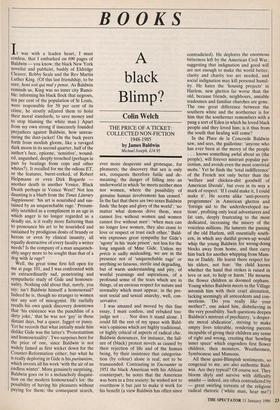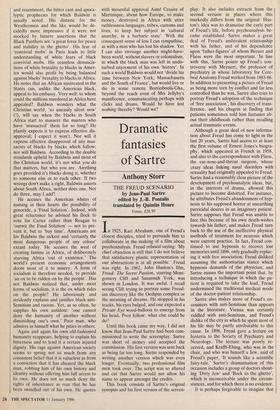BOOKS
A black Blimp?
Colin Welch
THE PRICE OF A TICKET: COLLECTED NON-FICTION 1948-1985 by James Baldwin
Michael Joseph, £14.95
It was with a leaden heart, I must confess, that I embarked on 690 pages of Baldwin — you know, the black New York novelist and publicist, buddy of Eldridge Cleaver, Bobby Seale and the Rev Martin Luther King. (Of this last friendship, to be sure, honi snit qui mal y pense. As Baldwin reminds us, King was no inner city Runci- ble: informing his black flock that negroes, ten per cent of the population of St Louis, were responsible for 58 per cent of its crime, he stoutly adjured them to hoist their moral standards, to save money and to stop blaming the white man.) Apart from my own strong if insecurely founded prejudices against Baldwin, how unreas- suring the dust-jacket! On the back peers forth from modish gloom, like a ravaged dark moon in its second quarter, half of the author's face, epicene, `sensitive', wound- ed, anguished, deeply trenched (perhaps in part by beatings from cops and other whites?). It recalled for me the odious ET, or the features, burnt-corked, of Robert Helpmann or even Dirk Bogarde another death in another Venice, Black Death perhaps in Venice West? Not less daunting is a blurb from the Times Literary Supplement: 'his art is nourished and sus- tained by an unquenchable rage.' Presum- ably intended as a compliment in an age in which anger is no longer regarded as a deadly sin, is it really more flattering than to pronounce his art to be nourished and sustained by prodigious doses of brandy or heroin or even by clinical insanity, all equally destructive of every faculty a writer needs? Is the company of a man unquench- ably angry more to be sought than that of a dog with la rage?
Well, the great tome first fell open for me at page 101, and I was confronted with an extraordinarily sad, penetrating and sympathetic study of Gide and homosex- uality. Nothing odd about that, surely, you say: isn't Baldwin himself a homosexual? Indeed he is, though no stranger to women nor any sort of misogynist. He ruefully recalls his own quick discovery downtown that 'his existence was the punchline of a dirty joke,' that he was not `gay' in those distant days, but a queer, faggot or pussy. Yet he records that what initially made him dislike Gide was the latter's `Protestantism and homosexuality'. Two surprises here for the price of one, since Baldwin is not widely famed as first wicket down for the Counter-Reformation either; but what he is really deploring in Gide is his puritanism, which invests all his work 'with the air of an endless winter'. More genuinely surprising, Baldwin goes on to a melancholy disquisi- tion on the modern homosexual's lot: the possibility of having his pleasures without paying for them; the consequent search, ever more desperate and grotesque, for pleasures; the discovery that sex is only sex, conquests therefore futile and de- meaning; the danger of falling into an underworld in which 'he meets neither men nor women, where the possibility of genuine human involvement has ceased.'
In the fact that there are two sexes Baldwin finds `the hope and glory of the world'; `no matter what demons drive them, men cannot live without women and women cannot live without men': 'when men can no longer love women, they also cease to love or respect or trust each other.' Bald- win expresses great sympathy for Gide's `agony' in his `male prison', not less for the long anguish of Mme Gide. Unless my précis is sadly misleading, we are in the presence not of `unquenchable rage' or anything so fatuous, sterile and degrading, but of warm understanding and pity, of woeful yearnings and aspirations, of a profound sense of the tears which are in things, of an envious respect for nature and normality which must appear, in the pre- sent social and sexual anarchy, well, con- servative.
I was amazed and moved by this fine essay, I must confess, and rebuked too: judge not . . . Nor does it stand alone. I could fill the rest of my space with Bald- win's opinions which are highly traditional, or highly critical of aspects of radical chic. Baldwin denounces, for instance, the fail- ure of (black) protest novels as caused by their rejection of life and of the human being, by their insistence that categorisa- tion (by colour) alone is real, not to be transcended. Contrasting in Encounter in 1951 the black American with his African counterpart, he notes that the American was born in a free society: he wished not to overthrow it but just to make it work for his benefit (a view Baldwin has often since contradicted). He deplores the enormous bitterness left by the American Civil War, suggesting that indignation and good will are not enough to make the world better; clarity and charity too are needed, and social indignation may kill personal humil- ity. He hates the 'housing projects' in Harlem, new ghettos far worse than the old, because friends, neighbours, amiable tradesmen and familiar churches are gone. The one great difference between the southern white and the northerner is for him that the southerner remembers with a pang a sort of Eden in which he loved black people and they loved him; is it thus from the south that healing will come?
In the Place de la Concorde Baldwin saw, and sees, the guillotine: `anyone who has ever been at the mercy of the people . . . knows something awful about us (the people), will forever mistrust popular pat- riotism, and avoids even the most convivial mobs.' Yet he finds the 'total indifference' of the French not only better than the `welfare and chicken-shit goodwill of American liberals', but even in its way a mark of respect: 'If I could make it, I could make it'. He scorns alike 'anti-poverty programmes' in American ghettos and `foreign aid to the underdeveloped na- tions', profiting only local adventurers and fat cats, deeply frustrating to the most dedicated, increasing the misery of the voiceless millions. He laments the passing of the old Harlem, still essentially south- ern, in which any dutiful grown-up would whip the young Baldwin for wrong-doing blocks away from home, and then carry him back for another whipping from Mam- ma or Daddy. He learnt there respect for his elders, not fear: `the child knows whether the hand that strikes is raised in love or not, to help or harm.' He mourns the flower children as doomed orphans. Young whites Baldwin meets in the Village astonish him with their cruel alienation, lacking seemingly all antecedents and con- nections. `Do you really like your mother?', one asked him, disbelieving in the very possibility. Such questions deepen Baldwin's mistrust of psychiatry, 'a desper- ate moral abdication', striving to make empty lives tolerable, rendering parents incapable of giving their children any sense of right and wrong, creating that 'howling inner space' which engenders first flower children, then monsters, Weathermen, Symbionese and Mansons.
All these quasi-Blimpish sentiments, so congenial to me, are also authentic Bald- win. Are they typical? Of course not. They bloom shyly and survive with difficulty amidst — indeed, are often contradicted by — great swirling torrents of the religiose radical rhetoric (`white man, hear me!') and resentment, the bitter cant and apoca- lyptic prophecies for which Baldwin is usually noted. His distaste for the Weathermen and the like would be de- cidedly more impressive if it were not mocked by bizarre assertions that the Black Panthers are 'a great force for peace and stability in the ghetto'. His fear of `convivial mobs' in Paris leads to little understanding of white fears of black convivial mobs. His ceaseless denuncia- tions of white brutality to blacks in Amer- ica would also profit by being balanced against blacks' brutality to blacks in Africa. He notes that an African mistreated in the States can, unlike the American black, appeal to his embassy. Very well: to whom could the millions murdered in Africa have appealed? Baldwin wonders what the Christian world, 'so uneasily silent now' (!), will say when the blacks in South Africa start to masacre the masters who have 'massacred' them for so long? He plainly expects it to express effective dis- approval; I expect it won't. Nor will it express effective disapproval of any mas- sacres of blacks by blacks which follow; nor will Baldwin. According to the double standards upheld by Baldwin and most of the Christian world, it's not what you do that matters, but who you are. Anything goes provided it's blacks doing it, whether to someone else or to each other. If two wrongs don't make a right, Baldwin asserts about South Africa, neither does one. Nor do three, may I add?
He accuses the American whites of nursing in their hearts the possibility of genocide, a 'Final Solution'. Indeed, with great reluctance he advised his flock to vote for Carter rather than Reagan to `outwit the Final Solution' — not to pre- vent it, but to 'buy time'. Americans are for Baldwin the sickest and 'certainly the most dangerous people of any colour' extant today. He accuses the west of creating famine in Africa, of deliberately starving Africa 'out of existence.' The world's present economic arrangements doom most of it to misery. A form of socialism is therefore needed, to provide `an ox to be ridden on by the people'. Has not Baldwin noticed that, under most forms of socialism, it is the ox which rides on the people? He laboriously and stridently explains and justifies black anti- Semitism and racism. Yet, as so often, he supplies his own antidote: 'one cannot deny the humanity of another without diminishing one's own.' Poor man, who admires in himself what he pities in others.
Again and again his own old-fashioned humanity reappears, helping to explain his bitterness and to lend it a certain injured dignity. His rage against American society seems to spring not so much from any consistent belief that it is valueless as from a conviction that it has cheated the black man, robbing him of his own history and identity without offering him full access to its own. He does not so much deny the rights of inheritance as roar that he has been swindled out of his own. He quotes with mournful approval Airne Cesaire of Martinique, about how Europe, to make money, destroyed in Africa with utter ruthlessness languages, tribes, customs and lives, to keep her subject in 'cultural anarchy, in a barbaric state'. With the consequent sense of loss I can sympathise, as with a man who has lost his shadow. Yet I can also envisage another might-have- been world, without slavery or colonialism, in which the black man was left in undis- turbed enjoyment of his own 'history'. In such a world Baldwin would not 'divide his time between New York, Massachusetts and the South of France', but would live or die in some remote Borrioboola-Gha, beyond the reach even of Mrs Jellyby's munificence, communicating perhaps with clicks and drums. Would he have lost nothing thereby? Would we?



























































 Previous page
Previous page